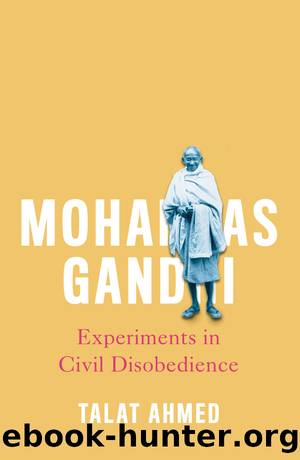Mohandas Gandhi by Talat Ahmed;

Author:Talat Ahmed;
Language: eng
Format: epub
Publisher: Book Network Int'l Limited trading as NBN International (NBNi)
The Class Basis of Gandhism
A short public correspondence, with all letters published in the Indian press, with Shapurji Saklatvala, the Indian Communist MP for Battersea North in London, in 1927 over questions of industrialisation and livelihoods of workers and peasants demonstrates some of the problems and limits of Gandhi’s concept of trusteeship and his wider programme for championing workers and peasantry.65 Saklatvala questioned him on the value and viability of spinning as employment. Gandhi had stated that two annas’ worth66 per day was sufficient for peasants engaged in the charka movement. Saklatvala picked up this point, and harangues Gandhi stating ‘would India have given you any importance, would India have allowed you to take the political leadership, would India have poured in lakhs of rupees in response to your demands if you had said that you wanted all this only for the purpose of adding Rs. 2 a day to the income of barely three percent of the Indian peasantry?’67
Saklatvala tried to make the case for the All-India Trade Union Congress, which Gandhi was reluctant to support in the belief that they antagonised employers by preaching ‘class warfare’. The crux of this debate was over the reluctance of the Ahmedabad textile workers to join the AITUC. Saklatvala believed the federation would be stronger as a national trade union body representing workers from all corners of the country. The Ahmedabad workers’ leadership was controlled by Anasuya Sarabhai, from a wealthy family of industrialists and business people, and her brother was one of the mill owners who had made an anonymous donation of Rs. 13,000 to Gandhi’s Sabarmati Ashram. Anasuya herself had opened a school for poor women and worked for the improvement of conditions for women and the poor more generally. Clearly, a section of indigenous industrial magnates supported Gandhi’s programme as a tradition of philanthropy existed, such as the Birla family discussed in previous chapter.
Saklatvala insisted on the right of workers to be organised and to challenge and fight for their rights against their exploitation, as militant and active workers. Gandhi’s response is telling, ‘I do not regard capital as the enemy of labour.’68 He was not against labour organisation but campaigned for it on ‘Indian’ lines, or as he put it more candidly, ‘my lines’.69 Gandhi’s benevolence and paternalism can be demonstrated by his analysis of the state of the Indian labour movement. ‘Labour in India is still extremely unorganised’,70 Gandhi noted, adding that ‘the Labourers have no minds of their own when it comes to national policy or even the general welfare of labour itself.’71 He insisted that labour had no cohesion, no mutual ties and was entirely divided. Gandhi’s own personal attitude to strikes in general was made explicit in 1921 when he wrote strikes ‘do not fall within the plan of non-violent non-cooperation’:72 ‘In India we want no political strikes … We must gain control over all the unruly and disturbing elements … We seek not to destroy capital or capitalists, but to regulate the relations between capital and labour.
Download
This site does not store any files on its server. We only index and link to content provided by other sites. Please contact the content providers to delete copyright contents if any and email us, we'll remove relevant links or contents immediately.
Blood and Oil by Bradley Hope(1460)
Wandering in Strange Lands by Morgan Jerkins(1279)
Ambition and Desire: The Dangerous Life of Josephine Bonaparte by Kate Williams(1273)
Daniel Holmes: A Memoir From Malta's Prison: From a cage, on a rock, in a puddle... by Daniel Holmes(1248)
It Was All a Lie by Stuart Stevens;(1191)
Twelve Caesars by Mary Beard(1134)
The First Conspiracy by Brad Meltzer & Josh Mensch(1075)
What Really Happened: The Death of Hitler by Robert J. Hutchinson(1066)
London in the Twentieth Century by Jerry White(1046)
Time of the Magicians by Wolfram Eilenberger(1026)
Twilight of the Gods by Ian W. Toll(1020)
The Japanese by Christopher Harding(1017)
A Woman by Sibilla Aleramo(1000)
Cleopatra by Alberto Angela(992)
Lenin: A Biography by Robert Service(979)
The Devil You Know by Charles M. Blow(929)
Reading for Life by Philip Davis(923)
1965--The Most Revolutionary Year in Music by Andrew Grant Jackson(867)
The Life of William Faulkner by Carl Rollyson(866)
